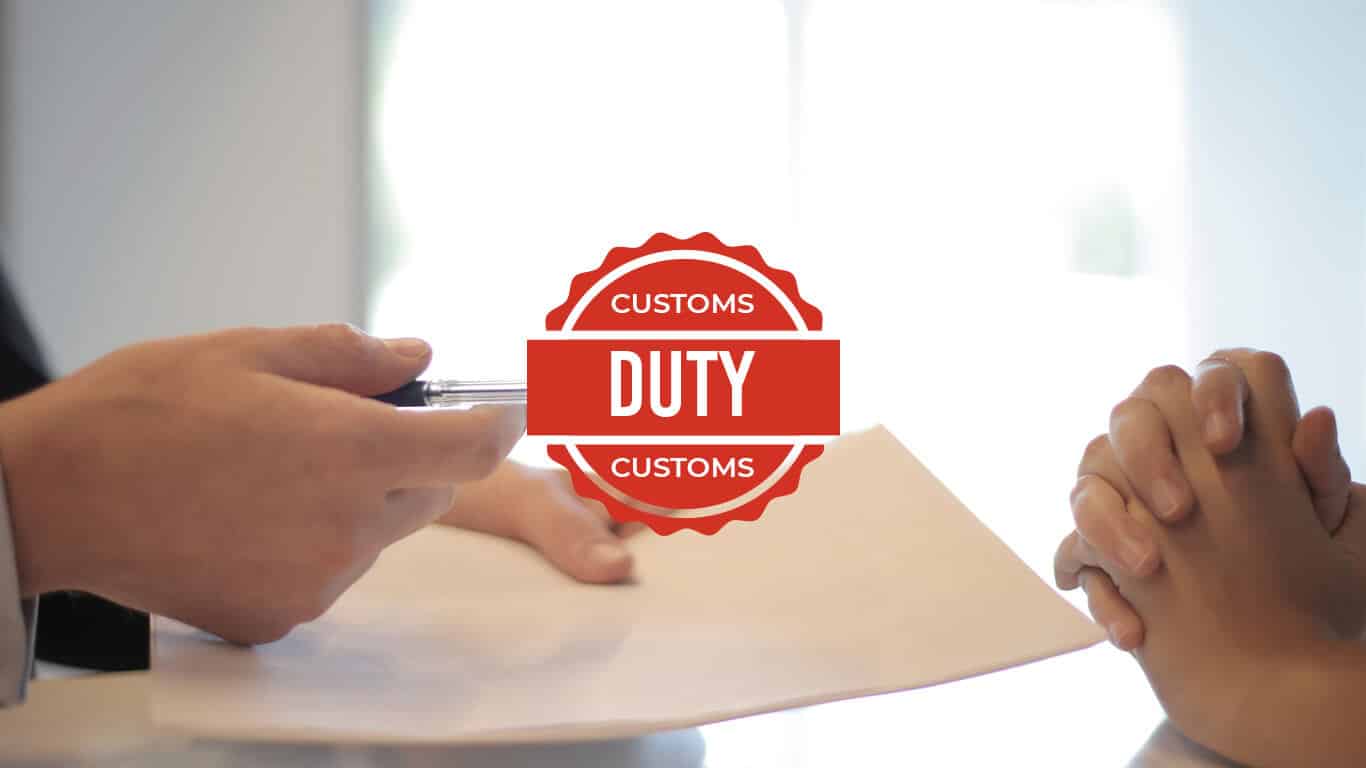GUIDE TO CUSTOMS DUTY
Welcome to SFL Worldwide’s Resource page – an informative guide for shipping basics, processes, documentation, prohibited items, and more.
Get Quote and Save UPTO 70% on your next shipping
Introduction
Here is a definitive guide that explains all you need to know about Customs Duty. When shipping goods abroad, your shipments may be subject to duties and taxes imposed by the customs officials of the home or destination country. Therefore, it is vital to understand customs duty before shipping your items internationally.
What is Customs Duty?
In this section, you will learn what is customs duty and excise duty, why they are applied, and how SFL Worldwide can help you calculate duties and taxes on your shipment.
Excise Duty is a kind of tax imposed on goods produced within your country and charged in addition to other indirect taxes. Customs Duty is an indirect tax, also known as import duty, that is levied on import and export goods sent or received through international shipping. These charges vary from country to country and depend on the specified country’s local customs rules and regulations.
Our team of shipping experts at SFL Worldwide uses U.S. Customs Duty Calculators to calculate the potential charges incurred on your shipments and compile the necessary documentation for customs clearance in the United States and several other countries. Failure to comply with these customs regulations can result in penalties and seizure of goods.
Rate calculator for Customs Duty
Customs duty rates is calculated based on the value of goods shipped, the purpose of shipment, HS Code, and manufacturing information related to the item. All goods and commodities are classified based on product type with the HS Code or Harmonised Commodity Description and Coding System. These codes are essentially a list of numbers used to organize products and simplify the calculation process.
The Customs officials use the information provided in your documentation and commercial invoice when using the U.S Customs Duty Calculator to levy the correct duties and taxes.
When describing the purpose of the shipment, define clearly the reason for sending or receiving a shipment. The intended purpose can be for gifting, personal use, commercial sale, or an international move. Whatever the reason, the purpose of the shipment needs to be explicit and verifiable, where applicable, in your documentation.
Failure to submit the correct HS code and information could result in an incorrect tax application on your shipment and possibly even delay your shipment. At SFL Worldwide, we have a team of experts to guide you through the process of compiling documentation for customs clearance.
Who has to pay the customs duty and why?
It is typically the responsibility of the owner of the goods or a customs broker to pay customs duty tax. Sellers and shippers cannot pay the customs duty tax before a customs clearance sale, and claiming to have done so is illegitimate.
To ensure all customs are correctly paid, prepare the documentation for payment ahead of time. A convenient option is to work with a customs broker or a shipping carrier who can pay the duty on your behalf and ensure your goods are cleared at the port of entry. Doing this saves you a lot of time and confusion.
Depending on DDP or DDU shipments, the shipping carrier or customs broker will collect customs duty before getting the shipment forwarded to the next destination. Learn more about DDP and DDU below.
What is DDP or Delivered Duty Paid?
DDP stands for Delivered Duty Paid, which means that the shipper assumes the responsibility for customs duty and taxes. As there is additional paperwork and financial transaction required, most of the shipping lines, carriers, or brokers will charge an additional fee for DDP shipments.
What is Delivered Duty Unpaid or DDU?
DDU stands for Delivered Duty Unpaid, meaning that the receiver stands the chance of acquiring surprise fees for customs duty & taxes at the destination port. At SFL Worldwide, we assist you in ensuring all necessary documentation & duties are submitted on time to avoid delays in shipment and make shipping with us incredibly easy!
Import Duties and Taxes
The terms ‘duties’ and ‘taxes’ are often confused, especially in shipping. Before we try to understand Customs Duty, let’s first understand the difference between duties and taxes.
What are Duties?
Duties are taxes imposed or levied on goods entering or leaving a country. Destination and home countries impose these taxes to protect their domestic industries. Additionally, this helps regulate foreign trade and increase revenue for the destination government.
What are Taxes?
On the other hand, taxes are charges imposed on individuals and businesses for transactions made in a country. Taxes ultimately falls on the entity that is being taxed, such as the business or individual consumer. Both duties and taxes are significant to a country’s economy.
Factors to keep in mind when calculating duties
There is no direct way to avoid paying customs duties levied on your shipments. However, there are things you can do legally to pay lower customs and excess fees.
- Buy and sell items that include duties in the invoice at the time of purchase. Many sellers these days will take responsibility for customs charges to make things less complicated for their customers.
- Work with an efficient shipping provider. Doing so is crucial for your reputation as a retailer. Shipping carriers like SFL Worldwide seamlessly handle customs duties on behalf of retailers and customers without the customer or retailers having ever to lift a finger.
- Include accurate, verifiable information. Any misinformation can lead to excess customs duties on your package.
- Communicate if the item is purchased for personal use to the seller as import duties are not applied to personal items. There may be some exceptions.
- Use Transfer of Residence in case of moving or planning an extended stay overseas to gain some relief from customs charges.
Calculate rates for U.S. and Overseas Locations
Tell us where you want to ship, how the items are packaged, and how big it is, and we’ll show you your options by speed and rate.
The Customs Clearance Process & Documentation Requirements
Before preparing your shipment, you must ensure the necessary documentation is in order. Your customs declaration form needs to include information on items being shipped, the purpose of shipment, and some supporting documents like the ones mentioned below –
- Commercial Invoices must include Incoterms, the item’s value, country of manufacture, and product classification.
- Packing list of the imported goods
- A Bill of Lading
- An Arrival Notice
Your shipper will advise on additional forms you must submit depending on the destination country. These documents must be attached externally so the customs officials can view them for examination. The customs authority will collect the customs duties from you, the individual, or the shipping carrier before releasing the goods from customs.
What are Incoterms?
Incoterms are, in simple words, the terms and conditions that clearly state who does what in the shipment process. Commercial businesses prefer including them for their cross-border transactions. They have information on costs associated with bringing goods to the port, insurance charges, import duty, additional transportation costs incurred, warehouse charges, and FOB Incoterms.
Additional Costs to Keep in Mind
When shipping goods internationally, please remember that there may be more to your shipping costs than the actual shipping price. This shipping cost is known as “landed cost,” which is the actual cost of shipment that includes all charges such as insurance, surcharges, fees, etc., from the point of departure to the destination.
The costs associated with your shipment can include –
- Shipper’s fees – Cost of shipping from point A to point B. Some shippers include all additional costs in their service package. Opting for an all-inclusive service is ideal if you prefer completing your shipment in fewer steps. SFL Worldwide takes care of everything you require for shipping from your door to your destination.
- Broker Fees – Cost paid to a customs broker for paying duties and clearing items from customs on your behalf. Your shipping provider may include this in their service. Check with your shipping provider before hiring a customs broker.
- Insurance – For any damage or loss in transit. You can purchase insurance individually or through your shipping provider.
- Surcharges – Additional costs incurred due to the nature of goods shipped and handled, such as dangerous items. – Additional costs incurred due to the nature of goods shipped and handled, such as dangerous items.
Frequently Asked Questions About Customs Duty
Most countries accept payments by credit cards and have a list of websites that allow you to pay taxes, duties, fees, and any charges incurred on imports or exports. Visit our country-related info page to access information on payment portals for your preferred country.
It takes anywhere from a few minutes to a few hours for parcels to be cleared without complications and with appropriate documentation. That said, the times can vary if there are missing documents and incorrect information, which can lead to significant delays in clearing your shipment.
Import duty is a customs duty imposed on goods imported into a country. The term “Customs Duty” can be classified as a duty levied on imports or exports.
Our site makes it easy for you to learn how to pay customs duty USA. Your expert shipping advisor at SFL Worldwide will provide you with a detailed list of supporting documentation necessary for the customs clearance process. They will walk you through every step of how to pay customs duty USPS, FedEx, or DHL, depending on your shipper.
A few examples of commonly imposed duties are Anti-dumping duty, Countervailing Duty, and Safeguard Duty.
Read Related Blogs
Check out SFL Worldwide’s blog for informational articles related to customs duties and all things shipping and moving. SFL Worldwide is a leading logistics provider of domestic and international shipping and moving. Click on the links below to enhance your knowledge of customs duties and international shipping.

CUSTOM DUTY EXPLAINED
Customs Duty is a tariff or tax imposed on goods that are transported across international borders.

What Is the Cheap Way...
With a booming eCommerce market, businesses are looking for new ways to expand and reach larger audiences.

International Shipping...
The procedures and regulations for international shipping are quite complex and require area expertise for a smooth process.
Conclusion
To learn more about the customs regulations in your arrival or destination country, contact our booking office at 1-800-691-2335 or send us a message on our contact page.
See our Trusted Reviews
Your trusted logistics partner for hassle-free door-to-door shipping and moving services.


